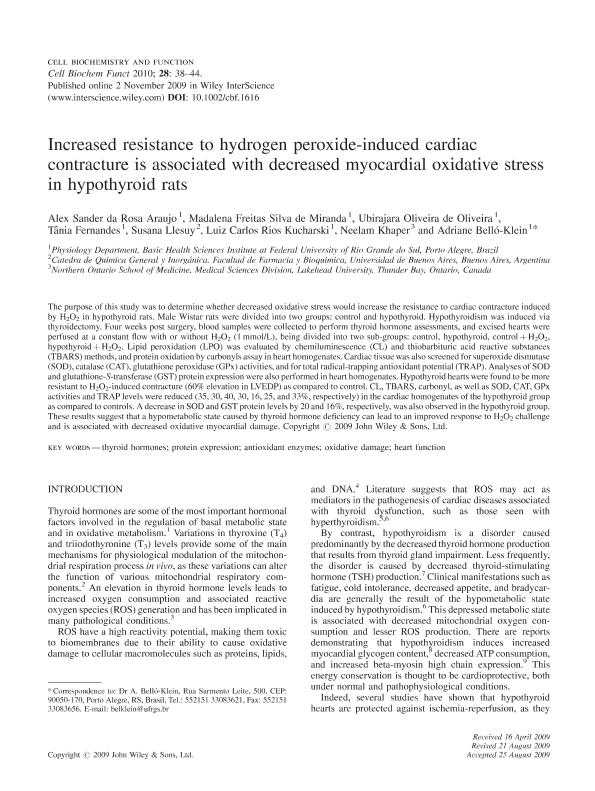Mostrar el registro sencillo del ítem
dc.contributor.author
Araujo, Alex Sander Da Rosa
dc.contributor.author
Miranda, Madalena Freitas Silva de
dc.contributor.author
Oliveira, Ubirajara de
dc.contributor.author
Fernandes, Tânia
dc.contributor.author
Llesuy, Susana Francisca

dc.contributor.author
Kucharski, Luiz Carlos Rios
dc.contributor.author
Khaper, Neelam
dc.contributor.author
Belló Klein, Adriane
dc.date.available
2019-01-08T19:06:52Z
dc.date.issued
2010-01
dc.identifier.citation
Araujo, Alex Sander Da Rosa; Miranda, Madalena Freitas Silva de; Oliveira, Ubirajara de; Fernandes, Tânia; Llesuy, Susana Francisca; et al.; Increased resistance to hydrogen peroxide-induced cardiac contracture is associated with decreased myocardial oxidative stress in hypothyroid rats; John Wiley & Sons Ltd; Cell Biochemistry And Function; 28; 1; 1-2010; 38-44
dc.identifier.issn
0263-6484
dc.identifier.uri
http://hdl.handle.net/11336/67677
dc.description.abstract
The purpose of this study was to determine whether decreased oxidative stress would increase the resistance to cardiac contracture induced by H 2O2 in hypothyroid rats. Male Wistar rats were divided into two groups: control and hypothyroid. Hypothyroidism was induced via thyroidectomy. Four weeks post surgery, blood samples were collected to perform thyroid hormone assessments, and excised hearts were perfused at a constant flow with or without H2O2 (1 mmol/L), being divided into two sub-groups: control, hypothyroid, control + H2O2, hypothyroid + H2O2. Lipid peroxidation (LPO) was evaluated by chemiluminescence (CL) and thiobarbituric acid reactive substances (TBARS) methods, and protein oxidation by carbonyls assay in heart homogenates. Cardiac tissue was also screened for superoxide dismutase (SOD), catalase (CAT), glutathione peroxidase (GPx) activities, and for total radical-trapping antioxidant potential (TRAP). Analyses of SOD and glutathione-S-transferase (GST) protein expression were also performed in heart homogenates. Hypothyroid hearts were found to be more resistant to H2O2-induced contracture (60% elevation in LVEDP) as compared to control. CL, TBARS, carbonyl, as well as SOD, CAT, GPx activities and TRAP levels were reduced (35, 30, 40, 30, 16, 25, and 33%, respectively) in the cardiac homogenates of the hypothyroid group as compared to controls. A decrease in SOD and GST protein levels by 20 and 16%, respectively, was also observed in the hypothyroid group. These results suggest that a hypometabolic state caused by thyroid hormone deficiency can lead to an improved response to H2O2 challenge and is associated with decreased oxidative myocardial damage.
dc.format
application/pdf
dc.language.iso
eng
dc.publisher
John Wiley & Sons Ltd

dc.rights
info:eu-repo/semantics/openAccess
dc.rights.uri
https://creativecommons.org/licenses/by-nc-sa/2.5/ar/
dc.subject
Antioxidant Enzymes
dc.subject
Heart Function
dc.subject
Oxidative Damage
dc.subject
Protein Expression
dc.subject
Thyroid Hormones
dc.subject.classification
Salud Ocupacional

dc.subject.classification
Ciencias de la Salud

dc.subject.classification
CIENCIAS MÉDICAS Y DE LA SALUD

dc.title
Increased resistance to hydrogen peroxide-induced cardiac contracture is associated with decreased myocardial oxidative stress in hypothyroid rats
dc.type
info:eu-repo/semantics/article
dc.type
info:ar-repo/semantics/artículo
dc.type
info:eu-repo/semantics/publishedVersion
dc.date.updated
2019-01-07T13:32:49Z
dc.journal.volume
28
dc.journal.number
1
dc.journal.pagination
38-44
dc.journal.pais
Reino Unido

dc.description.fil
Fil: Araujo, Alex Sander Da Rosa. Universidade Federal do Rio Grande do Sul; Brasil
dc.description.fil
Fil: Miranda, Madalena Freitas Silva de. Universidade Federal do Rio Grande do Sul; Brasil
dc.description.fil
Fil: Oliveira, Ubirajara de. Universidade Federal do Rio Grande do Sul; Brasil
dc.description.fil
Fil: Fernandes, Tânia. Universidade Federal do Rio Grande do Sul; Brasil
dc.description.fil
Fil: Llesuy, Susana Francisca. Universidad de Buenos Aires. Facultad de Farmacia y Bioquímica; Argentina. Consejo Nacional de Investigaciones Científicas y Técnicas. Oficina de Coordinación Administrativa Houssay. Instituto de Bioquímica y Medicina Molecular. Universidad de Buenos Aires. Facultad Medicina. Instituto de Bioquímica y Medicina Molecular; Argentina
dc.description.fil
Fil: Kucharski, Luiz Carlos Rios. Universidade Federal do Rio Grande do Sul; Brasil
dc.description.fil
Fil: Khaper, Neelam. Lakehead University; Canadá
dc.description.fil
Fil: Belló Klein, Adriane. Universidade Federal do Rio Grande do Sul; Brasil
dc.journal.title
Cell Biochemistry And Function

dc.relation.alternativeid
info:eu-repo/semantics/altIdentifier/doi/http://dx.doi.org/10.1002/cbf.1616
dc.relation.alternativeid
info:eu-repo/semantics/altIdentifier/url/https://onlinelibrary.wiley.com/doi/abs/10.1002/cbf.1616
Archivos asociados
